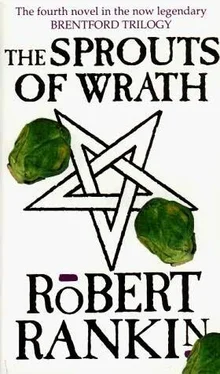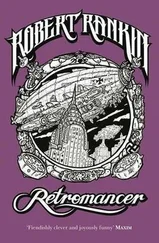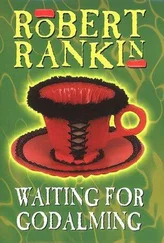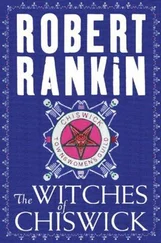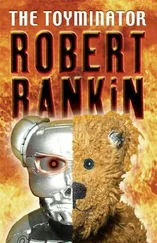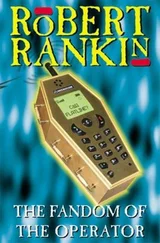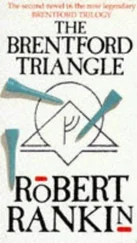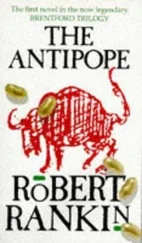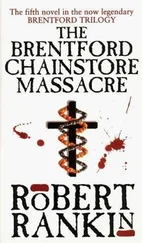Robert Rankin - The Sprouts of Wrath
Здесь есть возможность читать онлайн «Robert Rankin - The Sprouts of Wrath» весь текст электронной книги совершенно бесплатно (целиком полную версию без сокращений). В некоторых случаях можно слушать аудио, скачать через торрент в формате fb2 и присутствует краткое содержание. Год выпуска: 1988, Жанр: Юмористическая фантастика, на английском языке. Описание произведения, (предисловие) а так же отзывы посетителей доступны на портале библиотеки ЛибКат.
- Название:The Sprouts of Wrath
- Автор:
- Жанр:
- Год:1988
- ISBN:нет данных
- Рейтинг книги:4 / 5. Голосов: 1
-
Избранное:Добавить в избранное
- Отзывы:
-
Ваша оценка:
- 80
- 1
- 2
- 3
- 4
- 5
The Sprouts of Wrath: краткое содержание, описание и аннотация
Предлагаем к чтению аннотацию, описание, краткое содержание или предисловие (зависит от того, что написал сам автор книги «The Sprouts of Wrath»). Если вы не нашли необходимую информацию о книге — напишите в комментариях, мы постараемся отыскать её.
The Sprouts of Wrath — читать онлайн бесплатно полную книгу (весь текст) целиком
Ниже представлен текст книги, разбитый по страницам. Система сохранения места последней прочитанной страницы, позволяет с удобством читать онлайн бесплатно книгу «The Sprouts of Wrath», без необходимости каждый раз заново искать на чём Вы остановились. Поставьте закладку, и сможете в любой момент перейти на страницу, на которой закончили чтение.
Интервал:
Закладка:
“Well, whoever, or whatever he is, he means business.”
“Perk up, Jim, we’re not beaten yet.”
Pooley stroked his jaw. “Something he said struck a chord, I’m trying to think what it was.” Professor Slocombe jiggled Pooley’s brain cells with an unspoken word. “Ah yes,” said Jim, “I remember. About the stadium, two feet in the water and three upon the land.”
“Yes?”
“It’s the old rhyme, ‘The Ballad of the Two Kings of Brentford’, you remember?”
“Tell me.”
“‘There live two kings of Brentford
Who fought for a single throne.
One lives in a tower of iron
and one in a tower of stone.’”
“Go on.”
“There’s a verse that goes,
‘And a black star rose above them
A sword in every hand.
Two feet upon the water
And three upon the land.’
That’s it.”
“There’s more,” said the Professor, “can you recall?”
“No,” said Jim, “my brain is gone. Something about a final battle and a ‘heart of burning gold’, but I can’t remember it.”
“Never mind, you have done very well. Two feet in the water and three on the land, the black star, that is clear enough.”
“I’m starving,” said Jim.
“Then I shall ring for breakfast.”
“Is it on the tariff or on the house?” asked Jim who, despite evidence to the contrary, was still nobody’s fool.
“On the house,” said the Professor. “You have certainly earned it.” He rang a small brass bell and Gammon appeared almost upon the instant, tray in hand. “You know what this means?” the Professor asked as Pooley set about the morning’s fry-up.
“Go on,” said Pooley, between munchings.
“It means that we must enter the stadium, the heart of it all lies right up there.”
“It will be a long hard climb.”
“An impossible climb, defended at every inch, I shouldn’t wonder, but you’ll find a way.”
“Me?” Pooley choked upon his toast.
“Oh yes,” said the Professor. “I am confident that you will come up with something.” Then you are a fool to yourself, thought Jim. “Oh no I’m not,” said Professor Slocombe.
41
At a little after eleven, Pooley stood in the Professor’s garden, breathing fresh air and pointedly ignoring the weeds which sprouted on the west lawn. The invisible barrier was down, which seemed a hopeful sign, and the sky was blue. At least Jim assumed it to be blue, for looking up, he remembered that what he was actually seeing was the image projected by the underside of the great stadium. The black star which rose above them. Jim shrugged away the chill which crept up his back, put his best foot forward and strode down to the Swan. “The condemned man enjoyed a hearty pint” being the order of the day.
To Jim’s amazement, the bar was already quite crowded, the piano was playing and Neville was going hell for leather behind the pump. The part-time barman spied Pooley’s approach as did a shabby-looking man in a greasy brown trilby, who cowered behind his newspaper.
“Well, well,” said Neville, “the wanderer returns.”
“Watchamate, Neville,” said the dejected Jim, “and a pint of Large, please.”
“And where’s your mate then?” Neville did the honours at the pump handle.
Pooley perused his unpolished toecaps. “I have no idea,” he said softly. “Hasn’t he been in then?”
“No,” said Neville, “he’s done a bunk.” He placed the perfect pint before his patron. “Jim, is everything all right?”
Pooley shook his head. “Anything but. I don’t know what’s happened to John, the Professor says …”
“Three more pints over here.” The voice belonged to Norman.
“Excuse me, Jim, I’ll be back in a minute.” Neville scooped up the pennies Pooley had placed on the bar and went off to serve the shopkeeper.
“He’s bunging money about like there’s no tomorrow,” said Old Pete at Pooley’s elbow. “I’d dive in now if I was you.”
“Oh yes, and what’s the celebration?” Jim asked, out of no particular interest.
“This Gravitite business. You know, that wondercrap that holds the stadium up. Norman’s knocked up his own version and you’ll never guess what?”
“He’s won the Nobel prize.”
“Not yet. But he took his formula down to the patent’s office and it turns out that there’s no patent on it. The other geezer never got around to having his registered. Norman is sitting on a gold mine.”
“My old brown dog,” said Jim. “Bravo the shopkeeper.”
“My thoughts entirely.”
“Watchamate, Norman,” called Jim along the bar. “How’s tricks then?”
“Never better,” crooned the half-drunken shopkeeper. “One for my good friend Jim, please, Neville.”
“Cheers, Norman,” said Old Pete, “nice one, old mate.”
“And another down that end for the fogey.”
“I’ve never cared for him, you know,” Old Pete confided in Pooley, “gets right up my nose he does.”
Jim sipped thoughfully at his pint. “He’s all right, he’s an individual.”
“He’s a bloody nutcase! So where’s your mate then? Work-shy as ever, it seems.”
“I don’t know, I’m not sure.”
“Thought he’d be getting some mileage out of these.” Old Pete drew out his silver envelope. “Did you get yours?”
“What are they?”
“Free tickets for the big match, everybody’s got one.”
Pooley raised his eyebrows and his glass. “Everyone in Brentford?”
“That’s the size of it. A bit of good has come out of this fiasco.”
“I wouldn’t go if I were you,” Jim advised. “In fact, I’d give the whole thing a very wide berth.”
“My thoughts entirely, yet again. I’m advertising mine in The Times , there’s a bungalow in Eastbourne in this for me. I’ll give you a fiver for yours if you want.”
Pooley hunched low over his pint, which was shortly joined by Norman’s freeman. “Mine seems to have been delayed in the post. If you want to give me the five spot now, I’ll drop it round when it arrives.”
“Do I look like a cabbage?” Old Pete asked. “On your bike, Pooley. Good luck, Norman.” He raised his glass towards the inebriate shopkeeper. “Here’s health!”
“So, Jim,” said Neville, when he had done with his servings, “what’s to do then?”
Pooley shook his head. How could he possibly explain what was going on to Neville? In the cold light of day it all seemed so much nonsense. He was still not certain that he had actually seen what he thought he had seen. It was too grotesque. The more he thought about it the more convinced he became that it was some drug-induced fantasy, brought on by incense and whisky. But John, however, remained quite as dead. “I’m not well,” Jim told Neville. “Something I ate or something. As for John, I just don’t know, truly.”
“I’m sorry you’re not feeling up to much, Jim. You said something about the Professor before we were interrupted.”
“It was nothing.” Without Omally, Jim felt pitifully alone, somehow incomplete. “Nothing at all, it doesn’t matter.”
“As you please,” replied the barman. “But listen, if John does show up, you can tell him he can have his job back here. He played straight with me. I owe him a lot.”
“We all do.” Pooley raised his glass. “You are a good man, Neville. There’s nothing the matter with mankind when there’s blokes like you around.”
“Well, thank you, Jim, I appreciate that.”
“You’re in a bloody wet mood,” said Old Pete. “Seen the light, have you?”
“Something like that — belt up, you old bastard.”
“Thanks very much,” said Old Pete.
Читать дальшеИнтервал:
Закладка:
Похожие книги на «The Sprouts of Wrath»
Представляем Вашему вниманию похожие книги на «The Sprouts of Wrath» списком для выбора. Мы отобрали схожую по названию и смыслу литературу в надежде предоставить читателям больше вариантов отыскать новые, интересные, ещё непрочитанные произведения.
Обсуждение, отзывы о книге «The Sprouts of Wrath» и просто собственные мнения читателей. Оставьте ваши комментарии, напишите, что Вы думаете о произведении, его смысле или главных героях. Укажите что конкретно понравилось, а что нет, и почему Вы так считаете.
